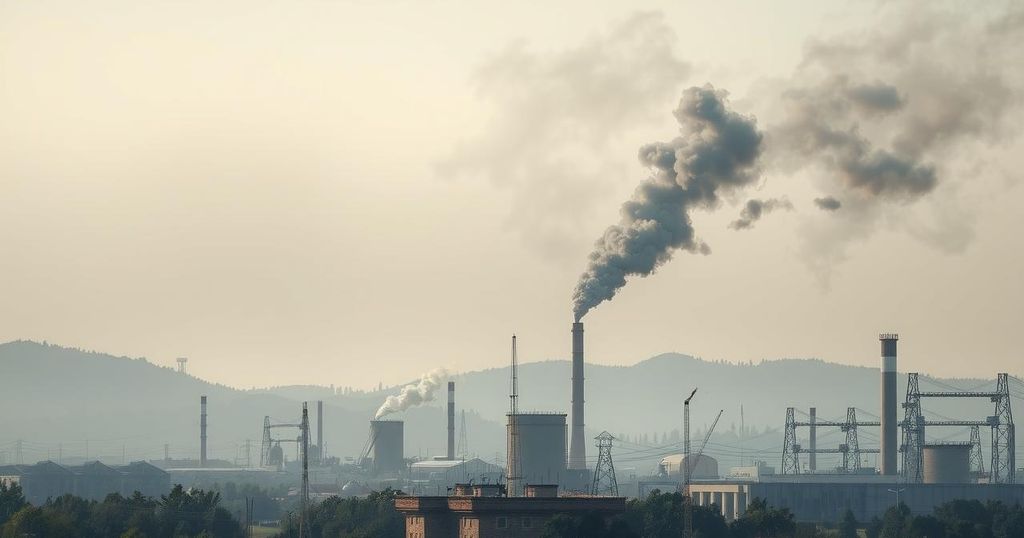The 2024 World Air Quality Report identifies Ghana, Nigeria, Chad, and Rwanda as starkly polluted nations, with Chad leading globally. The findings indicate severe air quality deterioration, impacting health and economic costs, particularly for Ghana, where urgent measures are needed to mitigate the crisis.
The 2024 World Air Quality Report has unveiled alarming pollution levels in Africa, highlighting Ghana, Nigeria, Chad, and Rwanda among the most polluted countries globally. This report underscores a critical air quality crisis that threatens the lives of millions across the continent.
Chad tops the global chart with a PM2.5 concentration of 91.8 µg/m³, significantly exceeding the World Health Organization’s (WHO) annual guideline of 5 µg/m³. Nigeria ranked 11th at 40.1 µg/m³, Rwanda 9th at 40.8 µg/m³, and Ghana 14th at 35.8 µg/m³, marking a notable decline in air quality across these nations.
PM2.5 particles are particularly dangerous, as they can penetrate deep into the lungs and enter the bloodstream, leading to severe health issues. They are significantly smaller than typical dust particles, making them an insidious health threat.
Research from the University of Chicago indicates that air pollution reduces life expectancy by 2.7 years in severely polluted regions. In Ghana alone, it was estimated that 28,000 individuals die each year due to pollution-related health problems. As of 2021, pollution contributed to approximately 8.1 million global deaths, emphasizing the urgent need for action.
In Ghana, pollution levels have reached alarming heights, now exceeding seven times the WHO’s recommended limits. Accra, noted as the 16th most polluted capital city, reported a PM2.5 level of 36.3 µg/m³, while Kumasi emerged as the most polluted city in Ghana at 39.5 µg/m³.
Ghana’s air quality has deteriorated significantly over the years, escalating from a rank of 27th most polluted in 2022 to 14th in 2024, with pollution levels rising from 30.2 µg/m³ to 35.8 µg/m³.
The report reveals that five of the world’s ten most polluted countries are in Africa, yet only 24 out of 54 African nations reported air quality data, indicating a severe lack of monitoring infrastructure. Almost 34% of African cities noted PM2.5 levels three to five times beyond the WHO guidelines.
Furthermore, air pollution is increasingly seen as a public health emergency in Ghana. Current estimates suggest that at least 2,333 individuals may die monthly due to toxic air exposure. Alarmingly, without immediate intervention, mortality rates from pollution could escalate substantially.
Beyond health, the economic implications are staggering. Reports predict that continued neglect of air quality in Ghana’s urban areas could lead to costs of approximately $137.8 billion by 2040 due to pollution-related impacts.
Globally, only 17% of cities meet the WHO air quality guidelines, while a small number of nations, including Australia and New Zealand, achieve clean air standards. In contrast, rapid urbanization and industrial emissions remain primary drivers of air pollution across Africa.
Current calls for action in Ghana emphasize the necessity for stricter vehicle emission regulations, investments in renewable energy, improved air quality monitoring, and policies against toxic waste burning. The urgency for these measures is paramount as Ghana finds itself among the world’s top polluted countries, posing challenges for future public health and economic stability.
The recent World Air Quality Report has underscored the critical and worsening air quality crisis in several African countries, particularly Ghana. PM2.5 levels exceed WHO recommendations significantly, prompting health emergencies and economic consequences. Immediate and decisive action is necessary: strengthening regulations, enhancing monitoring, and investing in renewable options. Failure to act may exacerbate public health risks and economic repercussions across the region.
Original Source: www.myjoyonline.com




